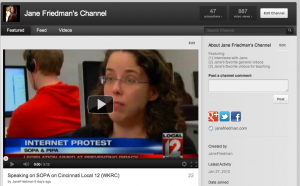Jane Friedman's Blog: Jane Friedman, page 195
February 7, 2012
7 Free E-Books for Writers
Last year, I rounded up some of the best free e-books for writers. That list deserves an update, so once again, here are the most valuable e-books and downloads that I recommend for all writers. If you know of others I should include, please leave a comment!
General Advice
Write Good or Die, a compilation of tips by Scott Nicholson, from bestselling authors such as MJ Rose, JA Konrath, Jonathan Mayberry, and more. Available in most formats via Smashwords, and also for Kindle.
Time Management for Creative People by Mark McGuinness. Ten very specific strategies and tactics! Available as a PDF.
Getting Published
How to Write a Great Query Letter by literary agent Noah Lukeman. Available for Kindle or as a PDF.
Marketing & Business
Smashwords Book Marketing Guide by Mark Coker. More than 30 actionable tips to help spread the word about your e-book. Available in most formats via Smashwords, and also for Kindle.
279 Days to Overnight Success by Chris Guillebeau. An oldie, but goodie. While not targeted specifically toward writers, it helps you understand how to think more like an entrepreneur. Helpful for indie authors. Available as a PDF.
Authority Rules: The 10 Rock Solid Elements of Effective Online Marketing by Brian Clark [via Authority Rules]. This isn't publicly offered as a PDF download these days, but you can still get the PDF by clicking here.
Industry
Book: A Futurist's Manifesto edited by Hugh McGuire and Brian O'Leary. Read the thought leaders on writing and publishing in a digital age. Available online only.
February 6, 2012
100 Tips to Alleviate Self-Doubt
This post is a crowdsourcing effort to come up with 100 tips to battle self-doubt. Since this post went live on January 20, 2012, we've been able to collect 73 distinct tips.
Click here to download a 1-page handout: 73 Tips to Alleviate Self-Doubt.
The original post & comments are below. If you'd like to contribute tips, we will update the handout until we reach 100. A big thanks to Matthew Turner (also known as Turndog Millionaire) for launching this experiment.
Do you sometimes look at your writing and want to throw up? You know the feeling, surly. One day you write something, read over it and think, "Wow, that's some rather snappy content!"
Then, just 24 hours later, you glance over it, scream at the screen and wonder how you wrote such dribble.
It's a similar feeling to when I look at pictures from five years ago, hair like a Cure groupie with a quiff nestled a good five inches above my head. Seriously, what was I thinking?
This constant tennis match of self-doubt is a regular part of my life, and I reason with myself that it's normal and everyone goes through this. Just like getting cold feet on your wedding day or panicking during a test you know you're prepared for.
The real problem here is I doubt my self-doubt! What if this self-doubt's telling me something? Maybe I should run away and leave it to the professionals?
But I keep on plugging away, because if I didn't I'd be a quitter. So I cling to the fact that others go through this, including people who have "made it" in every sense of the word. Just about every blog I come across has a post like this, describing the eerie feeling of hating your own work and discovering you're a fraud.
And I've just entered a contest on Men with Pens, the head honcho, James, opening up two free places on his writing course for those doubting their writing. At last count there were around 30 entries, and many of the posts are great, from people who definitely don't need help with their craft. Saying that, they may look at mine and think exactly the same … hmmmm, or maybe not.
So I insist that this is normal and everyone goes through this overanalyzing crazy maze of AHHHHH. Some people, like me, go through it often. Others may only feel it from time to time. But I'm insistent everyone goes through it.
I'm here to offer three tips that have helped me in my times of need:
1. Walk away from it.
I let my mind sulk, come back a day or so later and try again. If I still feel the same then I make changes.
2. Listen to music
This is a passion for me and listening to some slow and often depressing folk makes me feel better and inspires me.
3. Exercise
I'm at my most cranky when I'm tired and lacklustre, and a bout of exercise helps me snap out of it. I find self-doubt and whiney go through life hand in hand.
There you go, these are my three wise tips. Funny enough, and unsurprising I'm sure, it took me a few attempts to get to the final three. I wrote them down happily, re-read them and sulked at the screen, and eventually copied this entire article to an e-mail to Jane and already wonder if I could have done better.
But the point of this post was not for me to offer advice, but instead to come to Jane with the idea of gathering ideas from fellow writers who've been through, are going through, or feel they will one day go through this episode.
So this is the deal you've unintentionally signed up for. To leave a comment below with three tips of your own.
Maybe you're a successful author who's been through this and given sage advice to lead you through.
Maybe you've had a teacher, friend, family member, or dentist even who's given you some amazing tips to deal with this self-doubt.
Or maybe you've just read something at some point and thought, "Wow, what a great idea."
It's not uncommon for Jane to get 30+ comments for a post, which would equate to over 100 tips. You might not find my tips helpful. Hell, you might not even find Jane's tips helpful either when she leaves them in the comments. But chances are you'll find one or two in a list of 100 that will help you along your journey—not just in writing, but life in general.
So it's over to you, my fellow brother and sisters of self-doubt. Let's help each other move forward and share our unbearable self-loathing.
 Matthew Turner (aka Turndog Millionaire) is a Marketing Strategist with an MA in Advertising & Marketing from Leeds University Business School. As an aspiring author, he blogs about book marketing, strategic planning for aspiring authors, and how new marketing techniques can be used in the world of publishing. Visit his website and blog.
Matthew Turner (aka Turndog Millionaire) is a Marketing Strategist with an MA in Advertising & Marketing from Leeds University Business School. As an aspiring author, he blogs about book marketing, strategic planning for aspiring authors, and how new marketing techniques can be used in the world of publishing. Visit his website and blog.
February 3, 2012
Best Online Reads + My Video Interviews in One Place
Want to follow my favorite stuff online?
Favorite online reads
If you use an RSS reader (such as Google Reader), then you can subscribe to what I consider "must reads" by pasting this link into your RSS reader. (Warning: I often +1 one-sentence aphorisms from Alain de Botton on Twitter.)
Or you can regularly visit my Google +1 page.
Back story: Ever since Google Reader stopped supporting their "Shared Items" functionality (see my old history of shared items here), I've been waiting for RSS functionality to be added to the Google +1 publicly shared items. The above link is my workaround for now.
Alternatively, you can subscribe to my Facebook profile, where I often publicly share articles of interest.
Favorite online videos + interviews with me
Also, I've collected all my online video interviews in one place, over at my YouTube channel. (You can also peek at some of my favorite videos + teaching videos.) Here are a few notable things to watch:
Future of Publishing with CGI Clubhouse
Interview with Michael Hyatt on writing and publishing
My playlist of videos related to advice on storytelling
Not on YouTube: My long interview with Dan Blank
If you know of any excellent YouTube videos related to storytelling/writing advice, I'm always looking for new ones to show my students or add to my favorites. Leave a comment with a suggestion.
February 1, 2012
6 Exercises for Stronger Character Relationships
As writers, we can spend so much time "fleshing out" our characters as individuals that we forget about the connections between them. That's why I love this piece by Yelizaveta P. Renfro that offers six concrete ways to think about your characters' relationships. Here's an example of one of the exercises:
Bury your characters. Imagine that your fictional family has purchased a cemetery plot that will hold twelve: two rows of six, one above the other. Draw out the plot and think about who will be buried where. Who is already buried there? For whom are the other spaces reserved? Who will be next to whom? Who gets the space under the oak? Who will not be buried in the family plot? Why? Think about the family politics underlying these choices. What kinds of monuments will the family choose to mark the individual graves? Imagine a scene taking place at the cemetery. Who is visiting the plot? Why? What happens?
If you like this prompt, you're sure to enjoy the others. Click here to read Creating the Fictional Family: No Character Is an Island, featured in the latest Glimmer Train bulletin.
January 31, 2012
3 Numbers That Matter to Your Platform
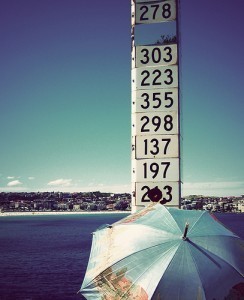
Macca / Flickr
Nonfiction authors have probably heard the refrain, "Build your platform! Build your platform!" but may not know what a strong platform looks like.
Every platform is different (we are all unique individuals!), but here are 3 specific numbers that can come in handy when proving the size, strength, or impact of your online platform, especially in a book proposal.
1. How many people visit your site monthly?
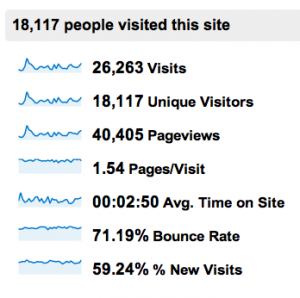
Google Analytics dashboard (there's a whole world of data waiting underneath these surface figures!)
This is easy to determine if you have Google Analytics installed. Check your dashboard and look at how many people visit your site in a month's time (the default view). See how that compares month-on-month, and year-on-year. Are you getting more visitors over time? What's the percentage growth month-on-month or year-on-year? This is hopefully a positive indicator that lends strength to your platform.
Other Google metrics that can be important to your platform include:
What content is most popular on your site, especially if it's highly ranked by Google's search engines. E.g., "My blog posts on how to bathe your cat are the most highly ranked for anyone searching cat bath." Or, "I receive more than 3,000 visits per month from people searching for cat bath."
How long people stay on your site. The longer people stay, typically the more compelling your content is. This is also called "site stickiness." Such visitors are more likely to respond to calls to action, buy things, click on ads, etc.
How people find your site. There is no "right" answer here, just insightful ones. For example, if you claim to have impact on Twitter or Facebook (see #3 below), that probably means a good portion of your site traffic should come from those sources. If you claim to be visible though search engines, your metrics should indicate meaningful search engine traffic. If your site is highly recommended by authorities in your community, you should be able to prove it by showing your referral traffic.
2. How many readers can you reach directly via e-mail?
Add the following numbers:
How many people subscribe to your site or blog via e-mail
How many people subscribe to your unique e-newsletter
How many people you would feel comfortable e-mailing personally about a book or product launch
This is the number of people you can reach directly via e-mail, and it's a number that's highly attractive to publishers. If you don't currently have a way of capturing e-mail addresses, then consider starting an e-newsletter, or offering an e-mail based subscription to your blog.
3. What level of engagement do you have through your online channels? (Or: What is your ability to get people to ACT?)
One popular way to determine your engagement is to look at Klout statistics. (Klout measures social influence.) Once you've told Klout about all the services you use, it will start to tally how responsive people are. Here's an example:
In this scenario, since I have roughly 145,000 followers on Twitter, and about 14,000 retweets/mentions, that reflects about 10% engagement. (Note: Don't get hung up on the Klout score itself; instead, study how well you engage the following you do have.)
Other ways to gauge impact and responsiveness:
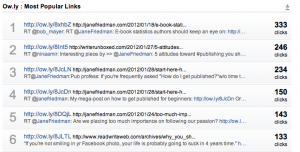
Part of a HootSuite analysis
Use HootSuite to send your tweets. HootSuite provides you weekly analytics of how your tweets "performed" in terms of clicks, replies, RTs, etc. That way, even if you have a modest following of, say, 1,000 people, you might be able to say that you engage 30-50% of followers in a single day of tweeting. Having a ton of followers isn't as impressive as actually having their attention.
Allow people to subscribe to your public updates on Facebook (via your personal profile). This is yet another number that helps indicate your visibility and impact through social networks. Of course, you may have a separate "business" profile page for Facebook; in that case, track how much engagement you have there. (If you have none, it's time to correct that problem!) But for those who don't have a business page, opening your profile up to subscribers is a great alternative. Click here for instructions on the Facebook subscribe function.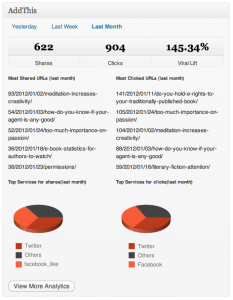
AddThis analytics
Track sharing statistics on your own site and through Google Analytics. I use the AddThis plug-in for my site, which publicly tallies the number of times an article is shared. This is very useful data to have on hand when making a platform statement about how well your content spreads. You can also use Google Analytics to help track how much of your traffic comes from social networks where you're active.
Consider this just the tip of the iceberg when it comes to all the different metrics you can collect related to your online platform. If you don't already have Google Analytics installed on your site, I recommend you start today!
January 30, 2012
4 Ways to Find the Right Freelance Editor

Local Japan Times / Flickr
Today's guest post is from author and copyeditor C.S. Lakin.
Whether you plan to submit your manuscript to an agent or publisher, or intend to self-publish, you've probably heard considerable advice about hiring an editor. (If you're still wondering if the investment is worth it, read Jane's post on the matter.)
This post assumes you've decided you DO need an editor. Here's how you can find the best one for you.
1. Get a referral.
Getting a personal recommendation from a trusted author is usually the best way to go. But even in those instances, you may find one author's choice may not be your best choice, especially if you write in different genres. Also, personality comes into play, and sometimes the fit just isn't right.
Personality aside, any editor that doesn't answer your e-mail, ignores your specific questions, or pushes you to hire her should set off red flags.
2. Look for testimonials and ask for references.
If you have no means of getting a personal recommendation, you can post to online discussion boards—or put out a call on your social networks—that you're looking to hire editorial assistance. When you have some candidates, look for testimonials on their site, then ask any editor you're considering for a few references.
A great editor doesn't need to have a lot of letters after their name, nor do they need to be able to give you a list of New York Times best-selling authors they've edited for. But they should have background or experience that makes them suitable to edit the type of work you have.
3. Ask professional agents and editors who they would use.
Some literary agents offer a list of recommended editors, such as this list on agent Rachelle Gardner's site. If you know any agents or editors, or have the opportunity to speak with them at a writers' conference, they can often refer you to someone they've worked with or can recommend. And speaking of writers' conferences—what better place to chat with lots of authors and ask them for an editor recommendation?
You can also look for independent editors at Publishers Marketplace, a book industry news and community hub ($20/month). Because it requires members to pay a monthly or annual fee, it's a good way to quickly access a high-quality list of industry freelancers.
4. Go through an established and reputable editing organization.
Editcetera, in Berkeley, CA, is one example of a group of very proficient and experienced editors that not only teach online and on-site workshops on editing, they also have a pool of editors who have gone through rigorous testing and application to become approved as their editors for hire. Some companies allow you to specifically choose the editor you want to work with; others do not. So be sure to read up on what they offer and how their service works.
How job cost is determined
Some editors charge by the hour, while others charge either by the page or word. I would opt for editors who charge by the hour, and here's why. When an editor sets a rate per page or word, they are usually figuring an average regarding the time they will spend editing a page or a certain number of words. That means if you are a proficient writer and self-edit your material well, you get charged the same as a sloppy or inexperienced writer who may require a complete rewrite of every sentence.
The flip side to this, of course, is if you are truly inexperienced and feel your book is a train wreck, and an editor is willing to do massive reworking of your material for a reasonable price. In that case, paying by the word or page may be a great deal for you.
However, you may wonder if an editor faced with a lot of messy material might rush to make his hourly rate. Surely he's not going to spend an hour on a page or two when he aims to edit eight pages an hour. An editor paid by the hour will not feel rushed and will spend just the right amount of time needed without that clock ticking in the back of his head. I may be generalizing here, but the professional editors I know charge by the hour.
A final note
If you've found someone who might be the right editor for you, but you're still hesitant, hire her to edit a few chapters. See how it goes—not just the editing but the overall communication and support. If the results are favorable, give her the rest of your manuscript to edit. Clearly tell her your concerns and needs, and ask questions if you don't understand something. Hopefully, it will be the beginning of a great friendship as well as a professional relationship.
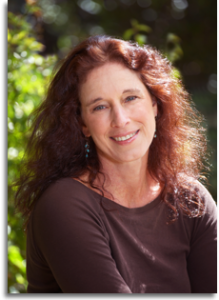 C. S. Lakin is the author of twelve novels, including the seven-book fantasy series The Gates of Heaven. She also writes contemporary psychological mysteries, including her Zondervan contest winner, Someone to Blame. She works as a professional copyeditor and writing coach and loves to teach the craft of writing. Visit her website for more information, or follow her on Twitter.
C. S. Lakin is the author of twelve novels, including the seven-book fantasy series The Gates of Heaven. She also writes contemporary psychological mysteries, including her Zondervan contest winner, Someone to Blame. She works as a professional copyeditor and writing coach and loves to teach the craft of writing. Visit her website for more information, or follow her on Twitter.
January 28, 2012
Start Here: How to Get Your Book Published

Scripta manent by Jano De Cesare / Flickr
Note: On Monday, January 30, I'm teaching a 2-hour live, online class with Writer's Digest on how to land a book deal in 2012. It's primarily for people new to the writing and publishing landscape, but I'll also discuss industry trends, i.e., how the digitization of media might affect your chances at getting a deal. The bread and butter of the session focuses on how to get a traditional deal through queries, proposals, etc, regardless of genre/category. Click here for a full description of the online class; it includes an opportunity to ask me any question you want, in a live setting. No question goes unanswered.
It's the most frequently asked question I receive: How do I get my book published?
Unfortunately, when I hear this question, I know I'm dealing with someone who is at such a beginning stage that it's difficult to know where to begin.
With this post, I hope to offer the most critical information and address the most pressing questions, as well as provide a starting point for more fully exploring what it means for you to try and get meaningfully published.
Have you just recently completed your book?
If so, honestly answer these three questions.
Is your book really done? Is it really the best you can make it? And have professionals (whether editors, agents, or published authors) encouraged you, because they see and know you are ready? Do you feel confident that it's ready to submit?
Are you informed enough about the publishing business to understand where to submit the work, how to submit the work, and what obstacles you might face? Does your work break the rules of the industry? If you don't know the answers to these questions, then you need to study up on the industry before submitting your work.
What is your motivation for trying to get published? A little self-reflection might be in order before you chase after an agent or publisher. Read my post 3 Questions Every Creative Person Must Ask.
Are you writing fiction or nonfiction?
Novelists follow a different path to publication than nonfiction authors.
Novels and memoirs: You must have a finished and polished manuscript before you even think about how to get published.
Most nonfiction: You must write a book proposal (basically like a business plan for your book) that will convince a publisher to contract and pay you to write the book. For more information on book proposals and what they entail, click here.
If you're writing a hybrid work (personal vignettes mixed with instruction, or a multi-genre work that includes essays, stories, and poetry), then you will have a difficult time getting a publisher to accept it.
Getting published is a step-by-step process of:
Researching the appropriate agents or publishers for your work. (Here's a list of free resources.)
Reading submission guidelines of agents and publishers.
Sending a query, proposal, or submission package.
What is a query letter?
The query letter is the time-honored tool for writers seeking publication. A query letter is a sales letter that attempts to persuade an editor or agent to request a full manuscript or proposal.
See my favorite how-to post on novel queries by Marcus Sakey.
You can also read my 10-part series on writing novel queries.
For special considerations on memoir, reference this post.
Important: Almost no agent or editor accepts full manuscripts on first contact. This is what "No unsolicited materials" means when you read submission guidelines.
However, almost every agent or publisher will accept a one-page query letter unless their guidelines state otherwise. (If they do not accept queries, that means they are a completely closed market, closed to new writers or submissions.)
Also important: Most major publishers will not accept unagented work. This means many writers should query agents rather than publishers.
How do you find an agent?
In today's market, probably 80 percent of books that the New York publishing houses acquire are sold to them by agents. Agents are experts in the publishing industry. They have inside contacts with specific editors and know better than writers what editor or publisher would be most likely to buy a particular work.
Perhaps most important, agents negotiate the best deal for you, ensure you are paid accurately and fairly, and run interference when necessary between you and the publisher.
Traditionally, agents get paid only when they sell your work, and receive a 15% commission on everything you get paid (your advance and royalties). It is best to avoid agents who charge fees, though standards are changing.
So … do you need an agent?
It depends on what you're selling. If you want to be published by one of the major Big Six houses (e.g., Penguin, HarperCollins, Simon & Schuster, etc), probably.
If you're writing for a niche market (e.g., vintage automobiles), or have an academic or literary work, then you might not need one. Agents are motivated to take on clients based on the size of the advance they think they can get. If your project doesn't command a sizable advance (at least 5 figures), then you may not be worth an agent's time, and you'll have to sell the project on your own.
Do you have to "know someone" to get published?
No, but referrals, connections or communities can certainly help! See the related question below about conferences.
Isn't traditional publishing dead? What about self-publishing and e-publishing?
Typically, writers who get frustrated by the endless process of submission and rejection often look to self-publishing for satisfaction. Why waste countless months or years trying to please this or that picky agent/editor when you can easily get your book available on Kindle (or as print-on-demand) at almost no cost to you?
Such options may afford you the ability to hold your book in your hands, but it will not get your physical book into stores or lead to many sales unless you're willing to put significant and persistent effort into marketing and promotion. Most self-published authors find that selling their book is just as hard—if not harder than—finding a publisher or agent.
To the credit of many who self-publish, independent authors can be fiercely passionate about their work and their process, and much happier and satisfied going it alone. But those who succeed and profit often devote years of their life, if not their entire lives, to marketing and promoting their work, and have a flair for entrepreneurship. In short: It's a ton of work, like starting a small business (if you do it right).
So, you can self-publish, but it all depends on your goals and what will satisfy you. To learn more about self-publishing, check out these posts:
Best 101 on Self-Publishing
No. 1 Most Important Factor for Writers Considering the Self-Pub Option
5 Things Beginners Need to Know About E-Book Publishing
What are the most important things to understand about the publishing industry?
Publishing is a business, just like Hollywood or Broadway. Publishers, editors, and agents support authors or projects that will make money and provide a good return on investment. It used to be that this return on investment could happen over a period of years or several books. Now, it needs to happen with one book and in less than one year.
Professionalism and politeness go a long way toward covering up any amateur mistakes you might make along the way.
Unless you live under a lucky star, you will get rejected again and again and again. The query and submission process takes enormous dedication and persistence. We're talking about years of work. Novelists and memoirists often face the biggest battle—there's enormous competition.
Never call an agent or editor to query or ask questions (or just chat) if you are not a client or author. Never query by telephone—and I wouldn't do it even if the guidelines recommend it. You'll mess it up.
Agents and editors do not want you (a non-client or author) to visit them at their offices. Do not plan a visit to New York and go knocking on doors, and don't ask an agent/editor for a lunch or coffee appointment if you don't have a relationship already. If you'd like to interact with an agent or editor, attend a writers conference.
When working with a traditional publisher, you have to give up a lot of power and control. The publisher gets to decide the cover, the title, the design, the format, the price, etc. You have to go through rounds of revisions and will likely have to change things you don't want to change. But you must approach the process like a professional, not a creative artist.
You must be an active marketer and promoter of your book. If you come to the table with media savvy or an established platform (audience or readership), you'll have an easier time getting that first deal.
For nonfiction authors: Don't go looking for a publishing deal because you're looking for the authority or platform that a book can give you. Rather, you must already have the platform and authority, and thus be qualified to write a book. YOU bring the audience to the publisher, not the reverse.
If you write fiction or memoir, the writing quality matters above all else. Read, practice, and polish. Repeat this cycle endlessly. It's not likely your first attempt will get published. It will likely be your second, third, or fourth attempt. Your writing gets better with practice and time. You mature and develop. If you write nonfiction, the marketability of your idea (and your platform) matter above all else. The quality of the writing may only need to be serviceable, depending on the category we're talking about. (Certainly there are higher demands for narrative nonfiction than prescriptive.)
Think beyond the book. A lot of writers have dreams of publishing a book because it's a dream that's embedded in our DNA from an early age. We are trained to believe that authors have some higher authority or credibility, and that we've really "arrived" once we deliver that book into the world. But there are ways to be more successful, and spread a message to even more people, that have nothing to do with authoring a book. Make sure that your goals are best served by the book format. Increasingly, in our digital age, a book is a poor option (or the final format) for your message or service.
Should you attend writing conferences? Which ones should you attend?
Yes, you should, and here's why.
Your education and insight into the industry will advance exponentially. You'll gain an understanding that's often impossible from just reading about it.
You will meet agents and editors, and start to see them as real people.
You may have an appointment or consultation with a publishing professional, and if so, it will shorten your path to publication. You can get the reasons, immediately, that an agent or editor may not be responding favorably to your work.
You need to connect with a peer group, and find people who can be mentors for you, and/or trusted critiquers.
You need time away from daily life to reflect on your writing goals and next steps.
Many writers are familiar with the reasons to attend conferences, but not all understand how to get more out of them. Here are 3 ways you can superpower your experience.
Select a conference where you can meet with a specific author, editor or agent who is absolutely ideal for your work (after lengthy and intensive research). Get a critique session or an appointment—but only if you feel like you've taken your work as far as you possibly can on your own. This is important.
During any formal appointments or critiques, plan to talk about 10-20% of the time. Before meeting, develop a specific list of questions that, if you had the answers, you would know specifically what your next steps are (for your project or your career) when you leave. Do not attend any appointment expecting to be offered a deal or representation. Go for the learning experience and the opportunity to have a professional consultation. That's what it is.
Closely study the backgrounds/bios of every speaker, agent, and editor who is attending. Be knowledgeable for any chance conversations you have; having this knowledge will also spark questions you could ask during panels or social hours. Don't be the person who asks the obvious question you could've figured out by paying attention to the program. Delve deeper. Make your questions count.
Should you hire professional help?
There's no one right answer for everyone, but I discuss considerations and guidelines here.
Reasons you might fail in your quest to get published
You rush to submit your work before it's ready. This is particularly true of writers who are fresh with the excitement of having just completed their very first book-length manuscript. If you've just spent months (or years!) writing a manuscript, why rush it to an agent or editor, and why rush it to just ANY agent or editor? And why rush it if you're new to the publishing business?
It's tough to achieve objectivity. When you finish a significant manuscript or proposal that took a long time to complete, you need time away and distance to assess it without feeling attached. And especially if you're trying to identify, from a market or commercial standpoint, why your work is appealing to agents or editors, a great amount of distance is required. This is my theory on why so many queries and proposals fail. The work itself may be outstanding, but the writer hasn't achieved the necessary distance to either evaluate or communicate the commercial merit of her own work.
It's tough to make progress without a mentor. You'll find a good critique partner is invaluable to your growth as a writer. When you don't have the time or willingness to take enough steps back from your work, or see its flaws, others can offer a really hard push.
It's easy to take validation from family and friends as a sign you ought to write and publish. Has your family encouraged you? Have your friends told you that you're a brilliant writer? Do your children love your stories? While you need support, you also need to ignore what these people are telling you. They're not publishing professionals. You need to write because you can't do anything else. Because you would suffer if you didn't. Your motivation to write has to come from within. Don't write (only) because you were given validation or permission by someone close to you. What you really need (require) is your own inner conviction.
How long should you keep trying? After how many rejections should you stop?
Some authors are rejected hundreds of times (over a period of years) before they finally get an acceptance. If you put years of time and effort into a project, don't abandon it too quickly. Look at the rejection slips for patterns or a direction about what's not working. Rejections can be lessons to improve your writing.
Ultimately, though, some manuscripts have to be put in the drawer because there is no market, or there isn't a way to revise the work successfully. Most authors don't sell their first manuscript, but their second or third (or fourth!).
Is it OK to post or publish my work online? What if I put out an e-book on my own? Am I ruining my chances at a traditional publishing deal?
No, you are not ruining your chances. Read more about this issue here.
Final note
I've met thousands of writers over the years, and I often encounter attitudes that are ultimately harmful to one's publishing goals. Read my post about 5 attitudes toward publishing you should avoid. Mostly what this game boils down to is patience. If you don't have it, you will get frustrated and give up.
Do you still have questions I haven't addressed here? Leave them in the comments.
Note: On Monday, January 30, I'm teaching a 2-hour live, online class with Writer's Digest on how to land a book deal in 2012. It's primarily for people new to the writing and publishing landscape, but I'll also discuss industry trends, i.e., how the digitization of media might affect your chances at getting a deal. The bread and butter of the session focuses on how to get a traditional deal through queries, proposals, etc, regardless of genre/category. Click here for a full description of the online class; it includes an opportunity to ask me any question you want, in a live setting. No question goes unanswered.
January 27, 2012
5 Attitudes Toward Publishing You Should Avoid
Today I'm over at Writer Unboxed, discussing the types of attitudes that make me want to issue red-flag warnings to writers. They are:
If I can't get a deal soon, I'm self-publishing.
I just want to get my book published.
Quality is subjective, and I don't need a professional editor.
I just need someone to really pay attention.
[x] isn't relevant any more.
Click here to read 5 Attitudes Toward Publishing You Should Avoid.
January 26, 2012
Writing on the Ether
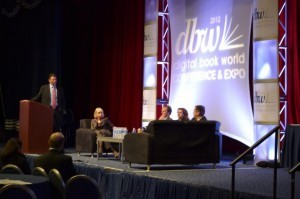
The CEOs panel, nominated by F+W Media CEO David Nussbaum, was onstage Tuesday at the Digital Book World Conference + Expo.
Note: Since publishing this column, I've had lots of good input from many folks, thanks. One especially keen comment comes from our good colleague Guy LeCharles Gonzalez, and I'm adding a link here to it in hopes that after you read my initial entry here you'll check Guy's very worthy counter-view and my comment that follows his. Thanks.
"Ether" / Or?
Just as the round tables were rolled into the Metropolitan Ballroom for the pre-conference DBW Marketing Summit…
Just as the chillers cooled the low-pile carpeted pitch, slammed so bravely in those third-floor meeting halls…
Just as publishing industry stakeholders talked of achieving the "impactful discovery of niche markets through metadata"…
A small door at the back of the Sheraton New York Hotel and Towers … clicked shut again for another year.
Apparently almost none of my tweets ever made it out of the Cone of WiFi Silence that was #dbw's meeting room at the Sheraton.[image error]about 21 hours ago via TweetDeckReplyRetweetFavoriteDon Linn
Did you hear it? Shhh. Listen. Hear that? Nah.
No more than you could hear DBW's Publishing Innovation Awards' new QEDs announced over the din of Monday evening's cocktail reception.
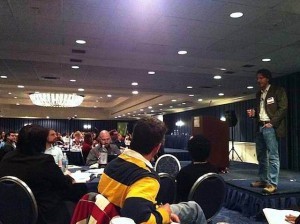
That author standing in darkness is Barry Eisler at WDC (Jan. 21, 2012) / Photo by Dan Blank
No more than you could read the big-screen displays of the good Jack McKeown's Verso Advertising slides about book-buying behavior Wednesday.
No more than you could be sure that it was really Barry Eisler on Saturday as he spoke in the annual darkness of the Sheraton's New York Ballroom place of honor. The speaker in the middle of that room gets less limelight than a Rockette shopping her memoir.
In fact, NaNoWriMo founder Chris Baty also spoke in that dim location. I might have guessed it was either John Malkevitch or Seth Godin on Viki Noe's shoulders, ship it.

Gathering for the first plenary session of the 2012 Digital Book World Conference.
If you have a "wait — what?" sensation when I mention bookly events on Saturday and Sunday — or if you look at the well-lit stage (left) at the Digital Book World Conference + Expo and wonder if you're in the same business — then your hearing is improving.
Wasn't that the pitter-patter of writers leaving the building?
And they missed such a good panel of literary agents Tuesday, some handsome candor at the table. Here was Brian DeFiore mentioning that "indie" just isn't the right term for a self-publishing writer. He's right, it's a euphemism. And Liza Dawson described her project with two existing clients — "we're the guinea pigs" — to explore together the ins and outs of self-publication.
Then there was the take-no-prisoners sass of Ginger Clark saying that if an author insists on self-publishing a project, "Ultimately? The client is my boss. I get out of the way or I lose that client."
Clark, who works with the Association of Authors' Representatives as does DeFiore, got off another good point: "If my client self-publishes, I'm not the publisher. The author's name is on that contract, not mine." At a time when the arrival of the agent-publisher is worrying a lot of us, Clark's clarification is right, and timely.
I'm sorry our writers didn't hear this panel and many other sessions of DBW.
The words of #dbw12: discoverability; metadata; direct-to-consumer; DOWNTON ABBEY.[image error]about 7 hours ago via webReplyRetweetFavoriteGinger Clark
Started out strong
I've just live-tweeted a series of conference events produced by F+W Media across six days at the Sheraton. I thoroughly enjoyed working with the staffers on this reductio ad tweetum and I found these colleagues and conferees focused and committed, always ready with a laugh. These events were full of good cheer and sound intent.
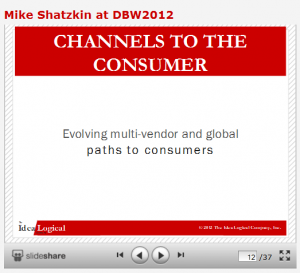 I also appreciate the heads behind the programming of #DBW12, especially Mike Shatzkin, the conference chair and architect of the confab. In his opening tone-setter, Remaking an Industry: What publishers need to be thinking about in 2012, we heard him lay out a series of issues to be addressed. He showed clean-as-a-whistle slides to keep us on track as he went.
I also appreciate the heads behind the programming of #DBW12, especially Mike Shatzkin, the conference chair and architect of the confab. In his opening tone-setter, Remaking an Industry: What publishers need to be thinking about in 2012, we heard him lay out a series of issues to be addressed. He showed clean-as-a-whistle slides to keep us on track as he went.
In some other parts of the world, Kindle does not start with the dominant position it had in the US (although it has the money to market and promote in a major way, so they might still get it.) Publishers need to cover all the ebook accounts and learn how to maximize sales in each of them.
By confab's end, things seemed less clear, of course.
This is not unusual in times of complex change and when the progressive discussion format of a conference "migrates" the perception of topics. Some points had outweighed others heavily in 48 hours.
DRM went from gum on a shoe to a rebel yell once Matteo Berlucchi was given the floor.
Talk of Apple's iBooks Author had given way to conversations about Houghton Mifflin Harcourt's deal to publish Amazon's New York adult line of print books. (Both writeups I've linked to here are by Laura Hazard Owen.) Other issues seemed never to get off the ground.
The words "partnership" and "collaboration" popped up early and often at DBW, as publishers, agents, editors, marketers, retailers, technologists, researchers, journalists, and consultants were treated to panel chats and presentations — one by the excited futurist David Houle on what he calls the Shift Age. You can download his ebook free, thanks to Dominique Raccah's Sourcebooks, which will publish a new Houle work later this year.
Amazon's Russ Grandinetti is pushing Kindle Format 8 (KF8) to publishers as ideal for graphic novel and children's book design #dbw12[image error]January 25, 2012 9:26 am via TweetDeckReplyRetweetFavoriteHeather McCormack
A surprise where I didn't expect it: Oren Teicher of the American Booksellers Association in his address, "Booksellers Without Borders," sounded genuinely moved as he assured the assembly Sunday that independent bookstores, overall, aren't as bad off as many think they are.
The unparalleled role that indie bookstores play in discovery…this unique role that we play…is an essential catalyst.
Romance authors are among the most active in engaging directly w/ readers via social media which is fantastic #dbw12[image error]January 24, 2012 11:36 am via HootSuiteReplyRetweetFavoriteKelly Leonard
A subtle lesson showed up when executives of several romance publishers went over best practices from their viewpoints, their publishing houses standing among pioneers in the industry for digital-first production. Raelene Gorlinsky of Ellora's Cave spoke as the veteran of this group when she talked about success with ebook prices up to $8 and more, her company resisting the "race to the bottom" in pricing.
But every time AllRomance.com moderator Julie Cummings used slides to offer statistics, the graphics were full of pastel colors and lightweight fonts. One of the folks at my table put her finger on it: "This is the look their readers understand," she said. The romance publishers had missed a chance to adopt the professional look they've earned. Calling your strategy "faster, harder, deeper" might get you a laugh but little respect in the morning.
And by the time #DBW12 was coming to a close late Wednesday afternoon, we were deep in the land of the unanswered issue.
Shouldn't publishers have their ebooks on public libraries' catalogs for checkout? Of course, said the suits of Wiley, Bloomsbury, and Perseus. "We don't have it yet, but we will…It just has to happen…It will happen." No time frame.
Much of the closing afternoon's material left points similarly adrift.
WTF? Now DRM is Amazon's fault, too? Did I miss Apple, B&N, Google and SONY's joint announcement that they've dropped DRM? #cmonson #dbw12[image error]January 25, 2012 4:45 pm via HootSuiteReplyRetweetFavoriteGuy L. Gonzalez
Don't try this at home
Earlier Wednesday afternoon, before we all gathered at DBW for blandishments in worsted wool, a panel called "Doing It on Their Own: Self-Publishing Authors Find Success" and moderated by DBW's Jeremy Greenfield, gave us three self-published authors and a provider of "author services" talking about their success.
These were exceptional cases. In this game, the trotting out of big winners is common. People who can answer questions about "the largest check you've had from your writing" with responses of $72,000 or $112,000 are not representative of what most writers can expect in self-publishing.
And to be fair, the panelists worked hard to communicate how difficult this sort of success is and that there are conditions that need to be in place. Bob Mayer, one of the three, has been tireless in trying to explain the importance of his traditional-publishing backlist in his own road to selling around 400,000 ebooks last year.
.@January 25, 2012 1:44 pm via HootSuiteReplyRetweetFavoriteDan Blank
I heard an interesting anomaly, a break from common palaver on the topic: the entrepreneurial author Bella Andre said that her relationship to retailers who sell her books is her most important connection. In a biz that stresses relating to your readers uber alles, touting the retailers instead is unusual.
You know who I wish had heard that? The ones who were out that door before DBW started.
On Sunday afternoon, hundreds of writers left the same hotel. They finished up in some of the same ballrooms that would on Monday be occupied by DBW. The Writer's Digest Conference, also an F+W Media production, is the flagship annual writerly confab. The writers were in conference from Friday through Sunday, then they adjourned before the comparative big kids of publishing arrived.
There's something about the stance of writers in the publishing community right now that isn't what it should be. It never seems more evident than when these two big conferences are choreographed to pass in the night.
We each discuss the others' business. In fact, publishing and writers are each other's business.
But writers miss the exposure they need to the facts, the figures, the charts, the debates, the genuine fiscal binds and occasional braggadocio of corporate insecurity. And they miss the charm and camaraderie of the DBW community. For the most part, these are fun, articulate, generous professionals.
I'm also sorry those specialists miss meeting so many members of "the talent" in one place. How many attendees of DBW (I'm hearing some 1,500 total this year) have seen WDC's Pitch Slam in progress? The agents have. They're the ones who sit across from jet-lagged and flummoxed writers who have 90 seconds to pitch their books. The agents respond for 90 more seconds. And then F+W's faithful Sally Slack announces on the PA system that it's time to move on. This goes on for three hours. Between 60 and 70 patient, supportive agents are there for 400 or more writers. Everybody stands in lines in these meeting rooms, a configuration vastly improved by Chuck Sambuchino and his cohorts this time around.
But this is the sole moment in which writers and their publishing counterparts come together in large numbers. Not that the resulting gulf is intentional, I regret the either/or reality at the Sheraton, the site (at least for the past two years) of these effectively firewalled conferences.
The back of my head appears more often than not in the #DBW12 flickr feed. Check out the great photos: http://t.co/oPiS9lQ2[image error]about 7 hours ago via webReplyRetweetFavoriteMatt Mullin
Good moves on the inky side
Sessions the writers attended this year in their conference included:
University of Cincinnati e-media professor and former Writer's Digest publisher Jane Friedman's clear eye for the myriad approaches and services for authors who want to try to self-publish,
Agent Mary Kole on the background and status today of YA literature,
The platform-driven entrepreneurial perspective of We Grow Media's Dan Blank and the tough-love career pounce of Christina Katz, better known as @thewritermama,
The devoted commitment of author James Scott Bell to the most elegant techniques of suspense (he shows a clip from The Graduate in his session),
Agent Donald Maass' hypnotic tones when he drops into "go ahead, just pick up a piece of paper and write this down" teaching mode (Socrates wept), and
The gravity of Baty's closing commentary: on Sunday, the founder of the international mass-writing movement announced at WDC that he had resigned two days earlier from the organization he has led for 12 years.
Baty is going full time into writing, himself. And he told these several hundred writers gathered for WDC to go home packed as he was packing, taking along:
Deadline
Momentum
An appreciation of the mess along the way
Faith
Yay! @January 25, 2012 2:03 pm via Tweetbot for iPhone Reply Retweet Favorite Colleen Lindsay
A proposal: Crossover Day
Writer's Digest Conference ends each year on a Sunday, midday. I recommend that F+W consider offering an extra "between-confabs" event on the Monday that falls between WDC and DBW.
Currently, that Monday is a day of workshops and the marketing summit, which I'm glad to say is being expanded to full-conference status in the fall — Kate Rados made the announcement to us while doing her expert job of moderating the day this week.
I'd like to see programming developed for that "between day" that could show the writers some of the issues the business folks are dealing with, and, perhaps, vice-versa.
The organizers of these conferences didn't invent the gap between creative and business workers, their conferences simply reflect it, and accurately.
But the industry overall can't benefit from an assumption that you're on either one side of the confab-weekend or the other. I found that I got a lot from being at both conferences this year and was very glad to be there for them. I hope to do this annually, there's too much here to miss. I recommend it. And a crossover option, I hope, might be structured as workshops are now, as an elective premium for attendees interested in adding it to their base registration.
There are practical reasons of space and time and expense, needless to say, that may always prevent both conferences running at capacity simultaneously.
Many elements of WDC, craft offerings in particular, just aren't in areas the publishing people can focus on for long. But that entirely necessary concentration on craft for authors can mean they know too little about the business, about technological changes, and about production availabilities and challenges.
And the DBW registration fee is a fairly big ticket for writers. It's just under $1,500 per person. Don Linn has a nice piece at TheFutureBook today, A Question and Some Random Observations. As he cracks wise, on noting that ticket price:
My conclusion from the previous observation is that we should all be in the publishing conference business.
Clearly, the pricing structure reflects cost, and the full fee for Writer's Digest Conference is about a third of that for Digital Book World.
But I hope there might be a chance to consider a "crossover" day when writers can opt to stay a day longer and work "with the industry" in the kind of format that F+W is adept at producing.
Nevertheless, again, do consider seeing what Guy Gonzales has to say about this.
His is a position that, while counter to mine, I fully respect — if anything, I'd apply it more quickly to myself than insist on it in others (another dodge of sorts, perhaps). Gonzales argues that in the age of the writer-entrepreneur, we must all take responsibility for our business basis and pay to play in the real game of publishing, not expect easy outs. And I should note that I was there in a business capacity of my own, very glad to live-tweet coverage of these conferences, a part of my work as a journalist. Here's a bit of what Guy says in Should more writers attend publishing conferences?
What comes with authors' shift to the business side is the reality that the water gets a lot deeper, particularly when it comes to attending conferences and registration fees. If you want to be a true self-publisher, there's a lot more to it than uploading your file to Amazon, and that includes bearing larger expenses like conference registration fees. Any author's money is just as good as any publisher's, and no conference organizer I know would turn it down. You want a seat at the table, buy a ticket like everyone else.
I'm not about to say Gonzalez is wrong on this. While I might like to see this "crossover day" programming as what I think would be a healthy ice-breaker for many new writer-entrepreneurs, there's everything right about Gonzalez's "buy a ticket" position. Good conversation.
Also, Bob Mayer is going to lead this entire audience in a sucessful invasion of the old RH building on 51st street. #dbwauthors[image error]January 25, 2012 2:03 pm via SeesmicReplyRetweetFavoriteGinger Clark
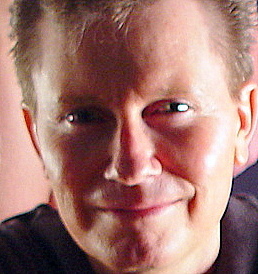 Porter Anderson is a Fellow with the National Critics Institute, and a producer and consultant formerly with the United Nations World Food Programme in Rome and INDEX: Design to Improve Lifein Copenhagen. As a journalist, he has worked with media including three networks of CNN, The Village Voice, and D Magazine. He reviews literary fiction, is a regular contributor to Writer Unboxed, and is based in Tampa.
Porter Anderson is a Fellow with the National Critics Institute, and a producer and consultant formerly with the United Nations World Food Programme in Rome and INDEX: Design to Improve Lifein Copenhagen. As a journalist, he has worked with media including three networks of CNN, The Village Voice, and D Magazine. He reviews literary fiction, is a regular contributor to Writer Unboxed, and is based in Tampa.
January 25, 2012
Seeking Your Feedback on the Reading Experience
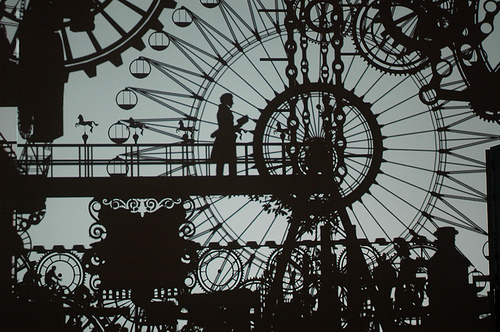
Design Act 2010 by RSNY / Flickr
As some of you may be aware, over the past month I overhauled my site design. I'm continuing to tweak and improve the experience and would value your feedback, especially from those of you who read my posts regularly on the site (rather than via e-mail or RSS feeds).
One thing I'll soon change is the appearance of the headers in my blog posts. Take a look at the two options below, and if you have a preference, do leave a comment. I'm also open to your suggestions on making the site more reader-friendly and usable.
SUBHEAD OPTION 1
SUBHEAD OPTION 2
Jane Friedman
- Jane Friedman's profile
- 1882 followers




